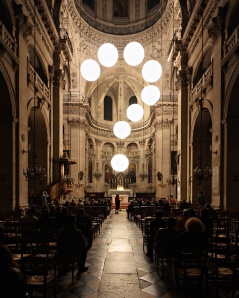Last week I heard something I didn’t expect to hear outside of a fundamentalist church, and it shook me up a little. Someone was talking about the importance of marriage, and they launched into an explanation of how marriage is a blood covenant. I’d heard passing references to this idea in the last year, but since I’d grown up in a church that never actually talked about sex, the whole “penis goes into vagina, vagina bleeds = blood covenant” idea was not one I was familiar with. I assumed that it was just something this one person had decided made sense and wasn’t that wide-spread.
But, last night when I was talking with my small group about the idea, it seemed like everyone in the room was way more familiar with it than I was– several had grown up hearing that “marriage is a blood covenant” and it didn’t stand out to some of them as unusual. How parents are supposed to keep the marriage-bed sheet as proof of their daughter’s virginity was cited as at least one example.
That disturbed me.
So, I’ve been doing some research today, and I’d like to talk about this somewhat common misconception that marriage is a blood covenant. When you google “blood covenant” all the results you’re going to get are many, many pages of Christians talking about it, which honestly wasn’t very helpful. It took me a little bit of digging until I finally grew a brain and consulted Judaic resources. That finally gave me a basic understanding of historical blood covenants:
The old, primitive way of concluding a covenant, (בְּרִית “to cut a covenant”) was for the covenanters to cut into each other’s arm and suck the blood; the mixing of the blood rendering them “brothers of the covenant” . . . A rite expressive of the same idea is the cutting of a sacrificial animal into two parts, between which the contracting parties pass, showing thereby that they are bound to each other.
There are only a few examples of blood covenants in the Bible that look like this– it seems that a lot of what modern-day Christians refer to as “blood covenants” are not really blood covenants at all. One of the few examples is interesting because of how it diverges from this: in Genesis 15, when God makes his first covenant, Abram sees it as a torch passing between the sacrificed animals, but Abram doesn’t follow. The significance of this covenant is that by passing through it alone, God declared that he will keep this covenant regardless of whether or not Abram did. The imagery of this is repeated, again, in the Crucifixion. Jesus did not require our blood to seal the covenant– just his.
There are, of course, other kinds of covenants, not just blood covenants, and I think one can argue that marriage is a type of covenant. It can be difficult to understand covenant as something different from a legal contract, especially since Christianity has been deeply influenced by a lawyer-like interpretation of the Bible for the last few centuries– but covenants are essentially about trust, while contracts are essentially about distrust.
The problem I have with talking about marriage as a blood covenant isn’t that I think it’s bad to think of marriage as a covenant– I think it’s horrible to think of marriage as a blood covenant for the very simple reason that it accepts violence against women.
I’ve written about this before, but the culturally accepted idea that female virgins bleed is just flat wrong. People with vaginas (who are not always women/female, to be clear) do not have to bleed the first time they have sex, and perpetuating this idea that bleeding is normal– in fact, it is necessary for a blood covenant— is wrong and harmful. It’s a teaching that has, at its core, the notion that female pain and suffering is completely normal, even unavoidable. It keeps alive the incredibly damaging notion that men do not have to care about a woman’s pain, in fact, they must cause her pain, at least occasionally.
People with vaginas who have sex only bleed when their partner has done violence to them. If your partner is hurting, then you hurt them and you need to slow down, listen to them, and care about their body. Most likely this harm is done in complete innocence, in ignorance, but it is disgusting when our churches, our pastors, our Christian teachers, push pain as good, even holy, because it is a “blood covenant.”
Instead, when we talk about sex, what we should be encouraging is a mutual understanding of our bodies, of how to bring and give and share pleasure, and most of all, to never ever believe that it is acceptable for one of us to experience pain.










